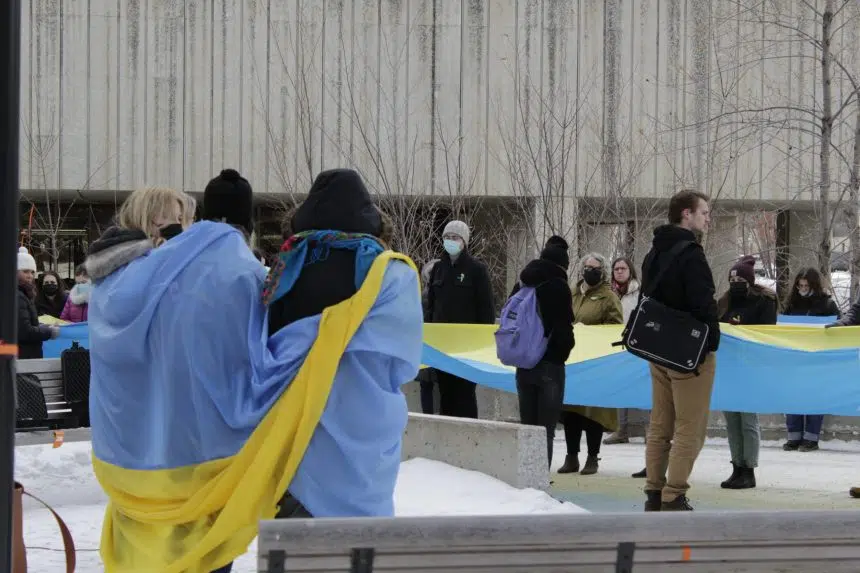A sense of heaviness and disdain is pervading the Ukrainian community in Saskatchewan as they try to keep hope while their country remains under attack.
Jensen Beaudoin, a fourth-year dual biology and agribusiness student is the president of the University of Saskatchewan Ukrainian Students’ Association (USUSA).
Beaudoin and Marta Krueger, secretary for the USUSA and a fourth-year fine arts major, have been friends since they met at camp as kids.
It was a youth Orthodox Ukrainian camp.
“It’s kind of funny, our story starts through our culture, which is great,” Beaudoin said.
Both girls grew up with a deep connection to their culture, despite being born in Canada. Through Ukrainian dance — Krueger danced for 10 years, Beaudoin for 18 and still does — language lessons and holiday celebrations, both students are intricately familiar with their Ukrainian roots and feel sincerely impacted by the events unfolding across the world in Ukraine.
Krueger said her mother is Ukrainian and her great grandparents immigrated from Ukraine to Canada.
“Our family has been very close to our culture always,” Kreuger said.
“I think it’s a unique thing we have as Ukrainian Canadians. We definitely have a big influence here in Canada … pretty much anywhere you go in Canada you can find someone who is Ukrainian.”
Beaudoin agreed, and said she particularly connected with her culture through Ukrainian dance.
“I think it’s amazing that you get the chance to learn about your history and you love this place that you’ve never even seen, it’s amazing.”
Last week, the USUSA organized a rally in support of Ukraine at the U of S campus in front of Murray Library.
The girls said that there is a universal sense of pride amongst Ukrainians in Canada for the country they come from. It’s that pride that makes hearing about the conflict in Ukraine so especially painful.
Krueger said she feels for everything happening because of how connected she is to her heritage. While customs and specifics of traditions might differ from one Ukrainian-Canadian household to the next, she said there are a lot of core cultural practices, beliefs and symbols that unite people in Canada today.
“The holidays that we celebrate, the clothing that we wear, the clothing that we pass down and pass through to each other,” Krueger said, as she and Beaudoin both sit wearing vyshyvankas — traditional Ukrainian embroidered blouses — passed down to them by family members.
Krueger’s white blouse — boasting a red and black standard pattern considered traditional because the colours are easily accessible — both stands out against and blends in with Beaudoin’s, which has a more floral pattern of blues and blacks.
“The wearing of our vyshyvanky was something that was kind of pushed out of Ukrainian culture, we weren’t allowed to express our Ukrainian-ness because of the Russian soviet regime,” Krueger explained. “Now that we have our independence and with so much Russian oppression in modern times, there’s been a very large push where people are again reclaiming the vyshyvanka, reclaiming the embroidery, reclaiming the tradition.”
Dancing is another way that Ukrainian-Canadians stay connected with their cultures.
“It just shows how we can be united no matter how little or much you are in touch with it,” Krueger said.
“We as Ukrainian people just put so much emphasis on gathering together and celebrating with our families and being open with our neighbours … any stranger that comes in, it’s immediately like, “Sit down, take off your coat, here’s some food, you look skinny, eat something,” Krueger said with a chuckle. “We’re very much willing to share and to express our culture.”
Krueger and Beaudoin were hoping to travel together to Ukraine with a spring session study abroad course offered through St. Thomas More College. That would have been in 2019, but COVID-19 intervened and prevented the trip.
It would have been Krueger’s second trip there.
“It breaks my heart, knowing that the beautiful cities, the beautiful streets that I walked on are under fire, that the people that I learned to love very quickly … it hurts knowing their safety could change in an instant,” she shared with emotion in her voice.
“It’s difficult knowing that they’re there and imagining what it would be like if I was the one in that situation.”
Krueger’s cousins still live in Ukraine. She said her family has been able to connect with them since the war began. They live in Lviv, one of the first places that was under attack when Ukraine was first invaded two weeks ago. Krueger said they are safe for now.
Beaudoin still hopes to one day be able to travel to Ukraine. She thinks it’s incredible to think about how many people from Ukraine have come to Canada to build the community seen here today — some families from generations ago and others as recent as a few months.
The students agreed that the way Ukrainians express their heritage best is by coming together, sharing differences and exploring similarities, then working together to promote them.
“It doesn’t matter how much you speak the language or not, the second that you hear someone speaking it or singing one of our traditional folk songs, you immediately just feel this longing in your heart for your homeland, for your family, for your country, for your companions … I don’t know how to explain it,” Krueger said.
Beaudoin said the ties keeping Ukrainians together are particularly felt throughout this conflict because of the most recent Russian oppression.
“We’re really trying to have this independence that we’ve worked so hard to have,” Beaudoin said.











